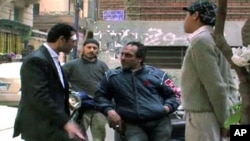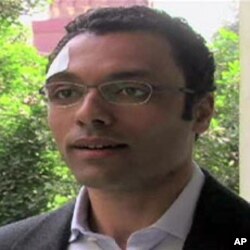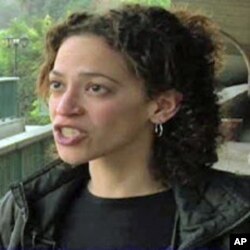The uprising against Egyptian President Hosni Mubarak is being called a "revolution of the young," with many Egyptians risking their lives to transform their country.
"It's such a thrill, when you're not afraid, and you know what you want, and you know someone wants to take it from you. I never thought that I'd be involved in something like this," Abu-Bakr Makhlouf said.
Abu-Bakr Makhlouf stands in his office and marvels at the video he took while protesting against Egyptian President Hosni Mubarak.
He had never been politically active. But a few days after the uprising began late last month, he went to Cairo's Tahrir Square to see it for himself.
That is when police started firing on the crowd, and he was caught in the middle.
Later Makhlouf was struck by a rock and carried to a makeshift hospital in Tahrir Square, "And I had my stitches in five minutes. It was so organized it was inspiring!" he said.
Like many young Egyptians, Makhlouf says he is fed up with the inefficiency and corruption that, he says, has led to Egypt's decline. His office is in Zamalek, a posh Cairo neighborhood that has all but lost its original grandeur.
Many young people also say they feel they have no future under Egypt's elder statesmen, foremost among them their 82-year-old president. But they're battling a culture that requires deference to age.
"We still do respect our elders. But now we know the difference between respecting your elders and saying 'yes' to something that is clearly wrong and bad," Makhlouf said.
Bad to Makhlouf also means dirty streets, 24-hour traffic jams and huge income disparities. He says he does not mind if Egypt's economy suffers because of the demonstrations. "It doesn't mean much to me if I get super rich right now and still look at very poor people in my country. It does not make sense to me," he said.
Many Egyptians of her age admit they do not know how to solve Egypt's daunting problems. But they refuse to accept autocratic rule for another 30 years. Because for them, that is a lifetime.






